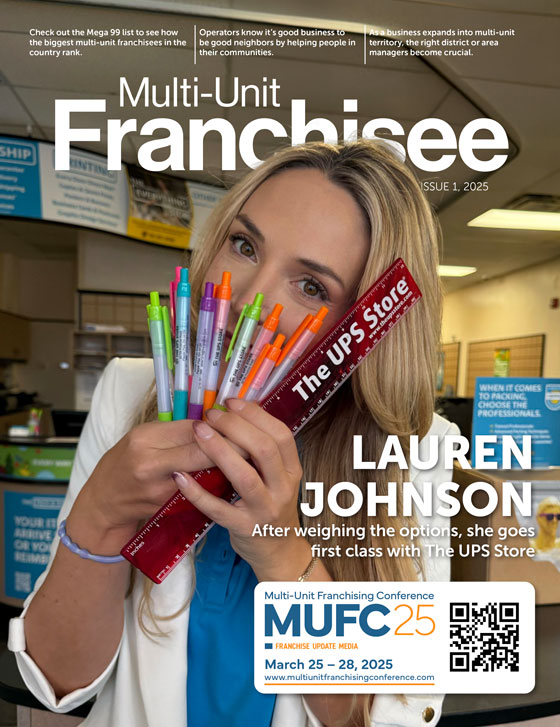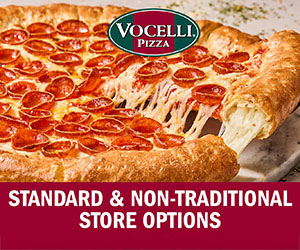From Soldier to Salon Owner: Army Veteran Chases his dreams with Franchising

Name: Patrick Elgin
Title: Owner
Company: Sola Salons
No. of units: 14 Sola Salons
Age: 39
Family: 1 son and 1 daughter
Years in franchising: 12
Years in current position: 12
When it was nearly time to rejoin civilian life after more than a decade in the Army, Patrick Elgin listened to his dad. During a Skype call half a world away from each other, father and son talked about franchising with Sola Salon Studios.
"I researched the opportunity during my downtime in Kuwait and felt it checked a lot of the boxes for what I wanted in a career," Elgin says. "When I met with the people with Sola, it just felt right. I joke that I am the first person to sign up with a franchise over a video call."
Like many other veterans who found careers in franchising, he says that joining a proven system helped with the transition from soldier to entrepreneur. Elgin says that serving in the military taught him to trust and follow structured systems, which makes franchising a promising career for veterans.
A year after returning from Kuwait, Elgin opened his first Sola Salons location in the Minneapolis metro area. He discovered how much he loved the personal freedom and opportunities that came with franchise ownership.
"Franchising allows you to take your future in your hands and make your dreams happen," Elgin says. "You have a lot more control over it rather than taking a salary position. You can get out of the grind and determine what success looks like for you."
After a dozen years with Sola Salons, Elgin now owns 14 studios in the Twin Cities market. Elgin has adopted a slow and steady approach to growth by averaging one new unit each year. Later this year, he will open the franchise's largest salon featuring more than 100 studios and premium suite amenities. He believes in the brand and hasn't felt the need to expand into other segments.
"We have an experienced and talented group of franchisees who all learn from each other. A rising tide lifts all boats," Elgin says. "Sola Salons has great name recognition, and our leadership team is very interested in taking it to the next level. We have cracked the code, and Sola is working for me. For as long as it works, I'll keep growing with it."
PERSONAL
First job: My first job was scooping ice cream as a 13-year-old. One of my teachers operated a mom-and-pop ice cream shop each summer, and it was great exposure to a retail environment. In my opinion, working in front-of-the-house retail is an amazing experience for a teenager.
Formative influences/events: I'm a U.S. Army veteran and went to United States Army Airborne School when I was 19. That was a shock for a suburban kid who had led a fairly sheltered life, and it toughened me a bit. Just like owning a small business, there were people to help me, but failure was a real possibility, so I had to take responsibility to make things happen. Getting exposed to experiences without a figurative or literal safety net early on is so valuable.
Key accomplishments: Raising two children and building a business at the same time without mucking up either one too badly.
Biggest current challenge: Trying to buck a national trend of increasing churn of our beauty professionals and building a strong community within our salons.
Next big goal: We will open the largest Sola Salons in the world in Minneapolis in 2025. It will feature more than 100 studio spaces with unique salon suite amenities, such as a fitness center, content creation studio, party space, mini-market, and self-storage units. We're so excited to join a hub for creative inspiration.
First turning point in your career: Transitioning from the Army to franchising.
Best business decision: Owning the real estate of my salon locations. I opened my first three salons with a strip center and then purchased a foreclosed property, which ended up doing more for the bottom line than the other three combined. You need to be deliberate on the front end when owning the real estate, but then there is no further work after that, and it makes more money. It was something I took from the McDonald's business model.
Hardest lesson learned: Sometimes, things don't work, and we just need to roll with it. No matter how prepared you are and how good the plan is, things do not always work as anticipated.
Work week: I'm thinking about work all the time, but I actually work 40 to 50 hours a week or however much I need to have the inbox at zero.
Exercise/workout: Five days a week but no more than 40 minutes. I like to do high-impact training activities like sprinting.
Best advice you ever got: To treat people with dignity and respect.
What's your passion in business? I want to inspire and empower beauty professionals to live their entrepreneurial dreams, which is one of the reasons why I was initially attracted to Sola Salons. What I'm helping them with is the same thing my franchisor helps me with, so I totally get it. I want my beauty professionals to be financially successful and have amazing amounts of agency in their lives, which is also what I want for myself.
How do you balance life and work? Not well! I'll openly acknowledge that I need to do this better. I can turn off my computer or put down the phone, but it is very tough to turn off what is in my brain. I want to work on giving myself permission to step away from the business when needed. It will always be waiting for me when I return.
Guilty pleasure: Carbs from beer.
Favorite book: Far too many to name but anything by Robert Heinlein, Leon Uris, and Michael Lewis.
Favorite movie: "Crimson Tide."
What do most people not know about you? I'm a huge fan of the TV show "Survivor."
Pet peeve: Being late to meetings.
What did you want to be when you grew up? An Army officer.
Last vacation: Every year, I take my kids to a place of their choosing. It was something my father did with me. Last April, I took my daughter on a father-daughter trip to Crater of Diamonds State Park in Arkansas. We spent a lot of time mining in the dirt for diamonds and had a great time.
Person you'd most like to have lunch with: Elon Musk.
MANAGEMENT
Business philosophy: Risk management doesn't mean avoiding risks entirely. In fact, taking no risks can be dangerous for any business owner. Instead, it's about carefully assessing the balance of risk and reward and making smart bets.
Management method or style: I want to avoid micromanaging my staff and instead enable them to succeed by helping them work through unique situations and providing big-picture guidance.
Greatest challenge: When I joined Sola, its name recognition in the Twin Cities was limited. We had to build Sola's reputation as a blue-chip brand one relationship at a time with our first hair stylists. We invested countless hours in these relationships and built a local reputation that would permeate the market. Since then, we've consolidated all the salons in the market under our common ownership, and Sola's brand awareness in the Twin Cities beauty industry is now extremely strong.
How do others describe you? Hopefully, someone who works hard and is reliable.
Have you ever been in a mentor-mentee relationship? What did you learn? Yes, I've had many formal mentors from my time in the Army, but I always seek out mentors every day. That is anyone who knows more about something than I do. I often try to figure out who that person is and then learn what I can from them.
One thing you're looking to do better: Systems technology so that we can automate some of our processes and increase our consistency.
How you give your team room to innovate and experiment: I encourage anyone to bring new ideas to the table, and we all debate them and choose whether to test them or not.
How close are you to operations? My primary focus is the finance side of the business and construction oversight, but I also regularly keep a finger on the pulse of operations.
What are the two most important things you rely on from your franchisor? A first-class website and assorted technology tools.
What you need from vendors: On-time deliveries and good communication.
Have you changed your marketing strategy in response to the economy? How? I don't find that marketing changes in response to the economy so much as it just changes on a regular basis. What worked in the past often does not work now. We need to be constantly evolving and opening new channels to reach our customers as the old channels have become ineffective. Obviously, personal connections and amazing service are far better marketing than any paid medium.
How is social media affecting your business? Social media is an important channel for us. Unfortunately, nearly everyone, including me, spends too much time on their phones. You must go to where your customers are, so we try to build a robust social media presence with a focus on real, local, uplifting content so that our messaging replicates real interactions instead of spammy polished ads.
In what ways are you using technology (like AI) to manage your business? I haven't figured out how to do that yet, but I've played around with it as a toy. Some people use it to write for them, but from my experience, it needs a few more generations before it sounds like your voice. I've been using it for research, and it can be useful for that. I would like to eventually use it to handle workflow and help with our onboarding process.
How do you hire and fire? This is an area where I've been actively trying to improve our company. Frankly, we have had such a small head count of actual employees for so long that we don't have great procedures yet.
How do you train and retain? This is another one where I'm in learning mode. Sola is a very low-employee model. Every new employee goes to our corporate office in Denver for onboarding and training. We've only grown the number of employees at our locations in the past few years.
How do you deal with problem employees? We've used informal counseling for many years, but now we're looking to codify that into formal written counseling with action plans.
Fastest way into your doghouse: Not being a team player.
BOTTOM LINE
Annual revenue: $8.8 million.
2025 goals: To maintain some of the highest occupancy rates in the Sola Salons system, to significantly outperform the system average in retention, and to open the largest Sola in the world.
Growth meter: How do you measure your growth? The number of studios I'm adding to my portfolio.
Vision meter: Where do you want to be in five years? 10 years? I want to continue with steady growth in the brand while decreasing my leverage ratio by borrowing less for growth than I did at the beginning.
Do you have brands in different segments? Why/why not? No, I'm not opposed to other concepts, but I feel like I've cracked the code on Sola, so why deviate from that? Better to continue with what I'm doing so long as it's working.
How is the economy in your region(s) affecting you, your employees, your customers? We've recently seen a slight decline in bookings, but it's too early to tell if that is a trend or noise.
Are you experiencing economic growth in your market? I would say that most submarkets are growing. A few are dropping off.
How do changes in the economy affect the way you do business? We're always sensitive to changing conditions, but a great aspect of the hair business is that it is incredibly recession resistant.
How do you forecast for your business? We have an annual budget process that has proven extremely accurate. For each line item, we look at expenses from the past two years and what it is projected for the upcoming year. I sit with the team and make the best determination for the business while factoring in what each salon is experiencing. I also want to be accurate in establishing budgets. Be aggressive and set good targets but also be realistic.
What are the best sources for capital expansion? I tend to prefer debt to equity infusions, but that is highly case dependent, and each instance needs to be individually analyzed to ensure your business is on a solid financial footing.
Experience with private equity, local banks, national banks, other institutions? Why/why not? Sola Salons has amazing banking and funding relationships that are ready to go for franchisees to get funded, build, and open for business. This is a huge added value, especially since brands in the salon suite segment don't qualify for SBA financing, so sourcing these relationships on your own would be incredibly difficult.
What are you doing to take care of your employees? We provide premium wages, bonus opportunities, and a host of benefits and perks.
How are you handling rising employee costs (payroll, minimum wage, healthcare, etc.)? I'm trying to grow the company at a faster pace than those costs rise, and I am simultaneously looking to build scale into our operations so that our growth can outpace our hires.
What laws and regulations are affecting your business, and how are you dealing with them? One thing we are watching closely is the national ban on noncompete agreements and whether that will become settled or thrown out. Potentially, this could have a big effect on releasing hair stylists currently working in commission salons.
How do you reward/recognize top-performing employees? Top-performing employees are going to receive compensation, recognition, and responsibility at a faster pace than other employees.
What kind of exit strategy do you have in place? While I have no plans to sell, I find most good decisions for the business are the same whether I hold for the next 20 years or sell tomorrow: specifically, building a strong management team where my contribution is additive rather than required.
Share this Feature
Recommended Reading:
| ADVERTISE | SPONSORED CONTENT |
FRANCHISE TOPICS
- Multi-Unit Franchising
- Get Started in Franchising
- Franchise Growth
- Franchise Operations
- Open New Units
- Franchise Leadership
- Franchise Marketing
- Technology
- Franchise Law
- Franchise Awards
- Franchise Rankings
- Franchise Trends
- Franchise Development
- Featured Franchise Stories
FEATURED IN

Multi-Unit Franchisee Magazine: Issue 1, 2025
| ADVERTISE | SPONSORED CONTENT |






 The multi-unit franchise opportunities listed above are not related to or endorsed by Multi-Unit Franchisee or Franchise Update Media Group. We are not engaged in, supporting, or endorsing any specific franchise, business opportunity, company or individual. No statement in this site is to be construed as a recommendation. We encourage prospective franchise buyers to perform extensive due diligence when considering a franchise opportunity.
The multi-unit franchise opportunities listed above are not related to or endorsed by Multi-Unit Franchisee or Franchise Update Media Group. We are not engaged in, supporting, or endorsing any specific franchise, business opportunity, company or individual. No statement in this site is to be construed as a recommendation. We encourage prospective franchise buyers to perform extensive due diligence when considering a franchise opportunity.